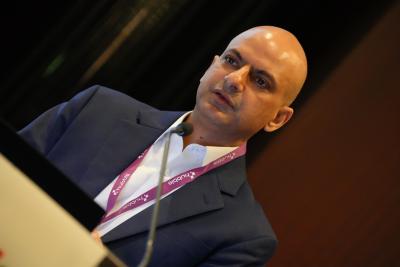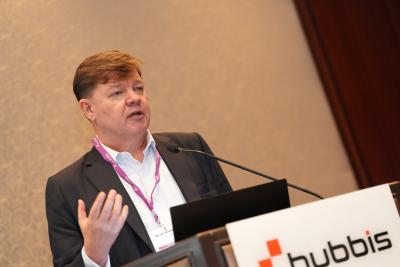The State of Play – RGN Offers Updates on the Rollout of CRS & AEOI Worldwide

Ivan Pelle of RGN
Feb 14, 2020
Ivan Pelle, an expert in international taxation and Executive Director and one of the Founders at Recontam Global Network (RGN) is on a mission to make its clients and partners aware of the rollout of CRS and AEOI worldwide, and how this might affect tax planning and investment strategies. He addressed the audience at the Hubbis Middle East Wealth Management Forum in Dubai to update them on practicalities around the Common Reporting Standard, as pertaining to participating and permanent non-reciprocal jurisdictions. Supported throughout by an excellent slide presentation, he also talked about the practical implications of the Automatic Exchange of Information. He explained the difference between territorial and worldwide income taxation. And lastly, he pointed to some practical examples of the rollout of CRS and AEOI as pertaining to the United Arab Emirates.
Pelle first offered some background on RGN, which he explained houses a specialist team of senior practitioners who craft bespoke solutions derived from a deep understanding of clients’ needs and ongoing objectives.
“Whether you are a high-net-worth individual, family office or an international corporation,” he explained, “our goal is to understand client priorities, now and for the future.”
RGN’s expertise
He reported that RGN’s expertise covers multi-disciplinary consultancy services for the international needs of family offices, worldwide tax planning and advisory, global residence and citizenship by investment programs, and retirement planning. It also covers the construction and administration of structures for unique purposes (such as a company, trust, or foundation), and the firm offers support for establishing and maintaining banking relationships in many different jurisdictions.
He then explained that he would cover three key topics and focus on their relevance to the Middle East markets. And he referred delegates throughout to slides that highlighted and clarified certain of the points he would make.
Three key topics
The first topic is the position of participating and permanent non-reciprocal jurisdictions as this pertains to CRS and AEOI. Secondly, he would look at the mismatch of territorial and worldwide income taxation. And thirdly, he would glance at practical experiences taken from the OECD, Global Forum report of 2018 and their impact on and implications for the United Arab Emirates (UAE).
Turning to his first topic of the day. “My mission today,” Pelle he explained, “is to look at regulation concerning taxation, as this is a vital area any asset manager needs to know about in order to properly look after their clients. To do so, we need to clarify what a participating jurisdiction under CRS means, as well as what a permanent non-reciprocal jurisdiction is.”
To participate…or not
A CRS participating jurisdiction is a jurisdiction with which an agreement is in place, pursuant to which there is an obligation to automatically exchange information on reportable accounts which are identified in a published OECD list. Meanwhile, a permanent non-reciprocal jurisdiction might be a country that is engaged in participating in AEOI, but that does not seek a similar reciprocal inflow of such information.
“As soon as that jurisdiction declares themselves to be a permanent non-reciprocal jurisdiction, they will supply information, but they will not seek to receive such data in return,” Pelle clarified.
Normally, he elucidated, the choice to be a permanent non-reciprocal country is driven by the fact that in that jurisdiction there might be minimal or zero taxation. With that, he listed countries including Anguilla, the Bahamas, Bermuda, Bahrain, the British Virgin Islands, Kuwait, Marshall Island, Nauru, Qatar, Turks and Caicos Islands and, notably, the UAE.
Who has signed up, with whom?
He explained that the OECD portal gives readers information on how the countries around the world have decided to sign up with other jurisdictions. It is not always a two-way street. In the case of the UAE, they might automatically send information on a Swiss resident’s banking in the UAE to Switzerland, but the UAE would not require information from Switzerland on a resident of the UAE who is banking in Switzerland.
“As you will appreciate,” Pelle observed, “this has major implications. If the Swiss resident, for example, has not fully declared income on that foreign account the resident would likely suffer tax litigation and penalties, and possibly going back some 10 years, all unpaid taxes and interest will be requested depending on the domestic tax of each country.”
One-way traffic
The opposite applies in the case of a resident individual in a permanent non-reciprocal jurisdiction. The UAE resident will not have their bank account information transmitted, so their Swiss bank accounts will not be exposed to the UAE authorities. “Wealthy individuals today, based on our experience, greatly value their privacy and knowing that their information will not be exchanged cross-border is very relevant indeed,” Pelle observed. “The UAE is not interested in getting financial data from Switzerland, or anywhere else.”
He gave delegates a practical example to highlight such a situation. A resident and taxpayer in Country A, Singapore, for example, also banks in Dubai, for this example Country B.
The Dubai financial institution will provide the information to the government of the Emirates, and the government of Emirates will provide the cross-border information to Singapore. “So,” he clarified, “as you can see here, it is not a matter of taxation, it is just a matter of information transmitted. The key here is that most wealthy clients would like, if possible, to get organised in a way where their data is well protected and of course not released cross-border.”
He then offered the example with a non-participant jurisdiction involved. “We switch this round, and the resident is now from Dubai and banking in Singapore, but now the UAE/Dubai has chosen not to receive information based on the MCAA Model chosen, so the information is not transmitted cross-border from Singapore to Dubai. It is a major difference.”
Territorial or WWI?
He then moved on his second topic of the day, namely territorial and worldwide income taxation. “Around the world,” he noted, “countries have to choose what they really want to maximise. The three main objectives of international tax rules aim at national wealth maximisation, tax fairness, as well as economic efficiency.”
He explained that this is especially relevant in relation to the capital import neutrality (CIN), or capital export neutrality (CEN) tax policies.
“Tax is claimed by tax authorities using resident-based taxation, territorial taxation, zero income taxation and citizenship-based taxation,” he explained. “Resident-based taxation is, of course, the most significant worldwide, in other words taxing the people resident in a country. But nowadays, countries tend to implement tax policies mixing the CIN and CEN concepts. Capital export neutrality implies that from a tax perspective, the investor is placed on an equal footing regardless of whether they choose to invest at home or abroad.”
By way of example, Mr X might invest in State S (source), pay 20% tax there, then receive a tax credit (credit method) for that 20% in State R (resident) and pay an additional 20% in State R to reach the standard 40% rate of State R his home country. “The capital export neutrality is based on the concept,” says Pelle, “that Mr X will be able to invest worldwide but charged at the same level as if he were investing at home. The result from State R point of view is that State R contributed with CEN tax policy to promote investments abroad of its resident; therefore State S collects 20%, and State R collects 20% (providing also a tax credit)”
On the other hand, capital import neutrality policy might be chosen by those countries that want to bring capital into their country.
Capital import neutrality (CIN) implies that Mr X, resident in State R, investing in a foreign country State S, and Mr Y resident in State S investing also in State S, should be placed on an equal footing from a tax perspective with respect to income sourced in the same State (State S).
Via a full exemption method State R will not collect taxes on the foreign investments made by Mr X, but State S will collect 20% taxes from Mr X and 20% taxes from Mr Y, therefore under CIN tax policy from State R point of view, State S collects 40% of taxes and State R 0% of taxes. Therefore, for Mr X, this fact of not being taxed in State R is an advantage, and for State R, is an attractive tax policy.
Pelle commented that the taxpayer and asset manager of today should be fully aware of how the tax system works where they operate. “Territorial taxation is a source-based tax system,” he commented, “meaning that income sourced in the country will be subject to tax, meanwhile, if sourced abroad, it may not be taxed, under the CIN tax policy.”
Nowadays, worldwide income taxation (CEN tax policy) is the most widely spread around the globe, because it is a residence-based tax system. “Despite this,” Pelle elucidated, “the current trend of the tax policymaker is to apply both two tax policies in the local tax law.”
Where are we now?
He then turned to his last topic, the 2018 OECD report, which as he had mentioned covers three years from April 2014 onwards. He explained that Singapore, for example, is entirely compliant with other countries under the AEOI and noted that in the period reviewed in the report Singapore received around 1000 requests of information from third countries about tax payments. “And as you can imagine, being so compliant under the CRS, Singapore replied to 76% of those requests within 90 days. Very impressive.”
Spotlight on the UAE
He then pointed to the Global Forum’s review on the UAE to highlight which are the deficiencies and what has been advised in respect of the 2016 peer review made.
“As you can see today,” he told delegates, “the Emirates are largely compliant under the Automatic Exchange of Information. During the period of the review goes from April 2015 to end-March 2018, the Emirates received 1400 access actions from jurisdiction to collect information on key areas. As to the availability of ownership information, availability of accounting information, availability of banking information, in the first round of report in 2016, the Emirates were rated partially compliant and now they are rated largely compliant. And by 30 June 2020, there will be another review to update the progress here.”
He mined down into further detail, noting that improvements are still expected in ownership and beneficial ownership information, book-keeping/accounting records, and banking information on accounts and their ownership.
“Another point that came up from the OECD report,” he added, “was that the competent authority should have the power to obtain and provide information that is subject of a request under exchange of information arrangement from any person within that territory or jurisdiction. In short, they found that there were some areas where some privilege was blocking the authorities to get the information they wanted and in addition to that the authorities did not push so hard to get information and this is not in line with the standards. Interesting, we think.”
He layered on another noteworthy point in regard to the obligation for exchange of information mechanisms to respect the rights and safeguards of taxpayers and third parties, consistent with international standards. “It appears that information that the Emirates is obtaining was used not only for tax purposes but also for other purposes, which is not appropriate,” Pelle commented. “Moreover, the UAE needs to act more rapidly, the OECD reported. The UAE under the period in review, received 1419 requests and among those, 479 requests were still pending at the date of the review and only 300 requests were replied to in 90 days. That is very slow indeed. But the OECD is pressing hard, so be prepared and be aware of complying with the information you have in the files.”
Don’t ignore these issues
“For all those here today,” Pelle said on closing his detailed and insightful talk, “working in the private banking and wealth management arenas, all this whole area of CRS, AEOI, legal ownership, beneficial ownership, and overall compliance are vital topics to understand and for all of you doing business in this industry, make your clients aware of these major issues, play it safe yourselves and advise your clients to do the same. In short, be informed and be compliant.”

Founder & CEO at RGN

More from Ivan Pelle, RGN
Wealth Solutions & Wealth Planning
The Global Rollout of CRS and AEOI and Some Practical Experiences to Date
Latest Articles






